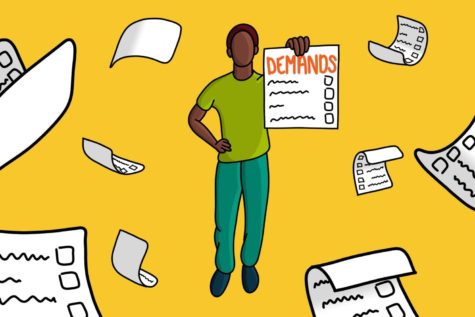OPINION | BSU can continue to make progress with student support

As Black History Month continues, students may wonder how best to support and engage with BIPOC student organizations on campus. When Chandler Brock, the president of the Tulane University Black Student Union, was asked what the organization would need in order to more successfully achieve its mission and goals, she said the first thing people can do is read their demands.
Brock is referring to the four-part list of expectations and demands of the Tulane BSU, addressed to President Mike Fitts, the Undergraduate Student Government Senate, the Provost, the president’s cabinet and the Tulane Board of Trustees.
The demands were released in July 2020 in light of the racial violence that was occurring around the country. The demands cover a wide range of topics, including the academics, finances, social life and health of undergraduate Black students at Tulane.
They advocate for reparations through education, financial compensation and destruction and replacement of racist and segregationist symbols. BSU offers specific policy guidance pertaining to anti-racist education and implicit bias training, hiring more Black faculty, Tulane University Police Department policing and admissions practices.
The extensive list of demands clearly and concisely outlines why the organization has these demands, what exactly they entail and how the university can fulfill them.
“I would say, first, reading the demands is where people can start. If you’ve read the demands, and you have questions about it, I think that I’m a very nice person …” Brock said. “If people want to have a conversation about the demands, email me, text me or something like that, because I am really open to that because I do understand how looking at them, you could be like, ‘Why does this even need to happen?’ But it is an important conversation.”
Members of BSU have monthly, and even sometimes biweekly, meetings about the unmet demands. Despite President Mike Fitts’ not publicly acknowledging the demands, the BSU has been working closely with a few members of the administration who Brock says have been very supportive but also realistic about the time frame it will take to see certain changes.
As BSU continues to be on the frontline of this movement, support from students can help them progress. Support could mean learning how to be a better ally, attending BSU events or donating to the organization.
Brock elaborates on being an ally saying, “On campus, you don’t need to be a part of every conversation, understand where you’re needed and where you need to take a step back and listen.”
She stresses that although non-BIPOC students are welcome, and even encouraged to be a part of the movement, participating respectfully requires students to be aware of when they are needed.
The BSU is organizing a variety of events during Black History Month and invites all students to participate. They are hosting three to four events per week, from the MLK Keynote speaker event with The Office of Multicultural Affairs, to open mics, movie nights and more.
While these events are hosted by the BSU primarily for Black students, Brock urges all students to attend them. She said, “these events are also for people who want to learn more about Black culture and the history of African American people at Tulane, in the nation and globally. So, I mean, I do want to invite people to engage with that.”
The BSU also welcomes donations from those looking to support the organization. Donations can help fund the variety of events they host throughout the year and their community service projects.
Brock said, “We also do a lot of community service, and we do things for the Black community in New Orleans … iif you’re able to get to donate money, please donate money.” Just in December, the BSU held a winter clothing drive with the Power People Project and the Holiday Toy Drive for New Orleans Women and Children’s Shelter.
The BSU continually fights to challenge racist history and ideology that still plague Tulane and the nation at large. While the administration may have turned their backs on BSU’s demands, Tulane students should still act as a force for good by supporting BSU and BIPOC students to the best of their ability.
Your donation will support the student journalists of Tulane University. Your contribution will allow us to purchase equipment and cover our annual website hosting costs.


